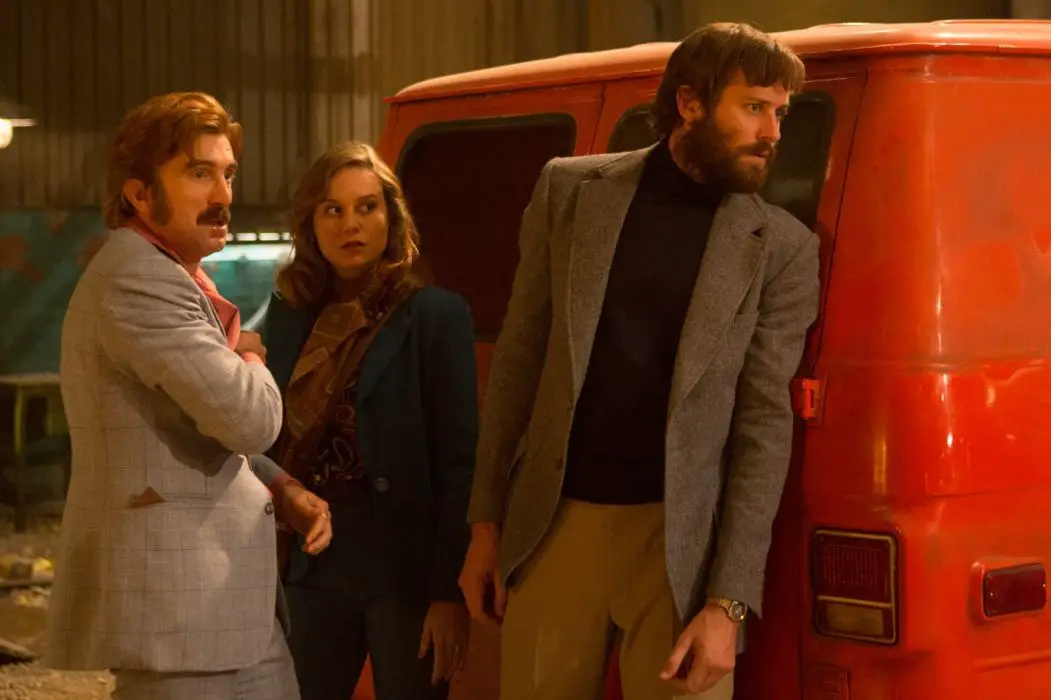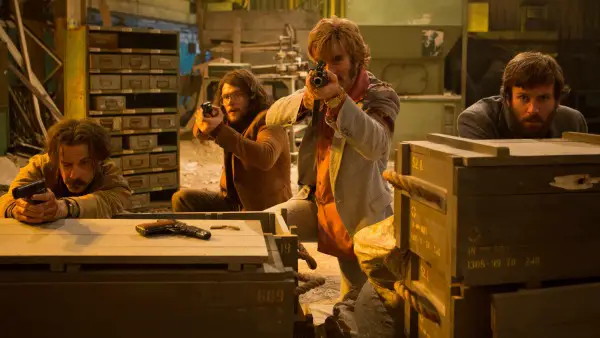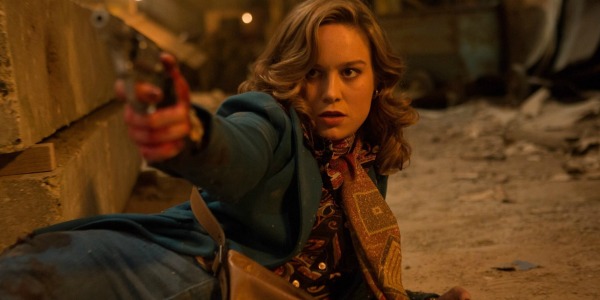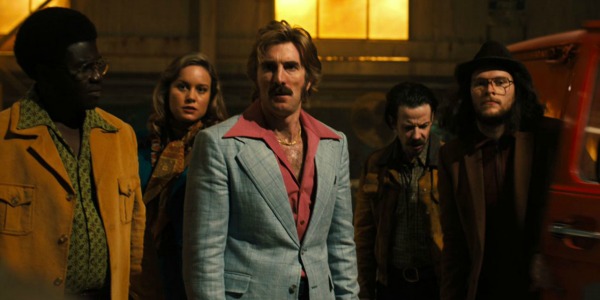FREE FIRE: Joyously Anarchic B-Movie Fun

Alistair is a 25 year old writer based in Cambridge.…
Ben Wheatley’s films are designed as an assault on the audience’s primal senses, tearing down our safety nets and then smashing them into barely recognisable pieces. His films have a tendency to sharply divide audiences – none more so than his prior film, JG Ballard adaptation High Rise, which managed to transform a blunt social commentary about the downfall of the British class system in to something that alienated many audiences who expected his highest budget film to date would also be his most commercial.
Although not as explicit as his prior films, it was still an assault on the senses of the casual cinema-goer, that could equally be seen as a work of flawed genius or a work of unheralded pretentiousness.
Cut to the chase storytelling
Instead of containing down the experimental route forged by High Rise and its predecessor, 2013’s A Field in England, Free Fire goes the opposite direction. If anything, after the arthouse experimentations of those works, it feels like a cinematic palette cleanser; a ninety minute B-movie stripped bare of its unnecessary elements. It is straightforward, cut to the chase storytelling, unfolding with a joyous anarchy that feels oddly naturalistic.
Set in Boston in 1978, the film is set in motion by a warehouse arms deal between a group of Irish criminals (Cillian Murphy, Michael Smiley), arms dealers (led by an extravagantly dressed Sharlto Copley and Armie Hammer), their drivers and the woman who helped to facilitate the deal (Brie Larson), who also happens to be the only sane member of the bunch. Upon entering the warehouse, Stevo (Sam Riley), who is helping transport the arms after the deal, notices that he got in to a bar fight with the arms dealer’s driver Harry (Jack Reynor) the night before.

When they notice each other, tension erupts because Stevo tried to come on to Harry’s underage sister the night before. Shots get fired and the deal goes awry, with relations between the two disintegrating and the intended transaction replaced by a high stakes shootout with no obvious rules.
Free Fire is brilliantly effortless in that although it features action choreography carefully built into its screenplay, it feels as unpredictable and unpolished as real violence. The film is reminiscent of Shane Black’s The Nice Guys in how it takes an underworld crime drama and pushes it into absurdity through its use of slapstick indebted bloodshed. Whereas Wheatley’s previous films showed violence at its most nihilistic and upsetting, here the film becomes more enjoyable because of its gratuitous carnage.
Where the sidekicks are the main characters
With the entire film being built around the central action sequence, it would be easy to assume that Wheatley’s film prioritises the purely visceral delights of unfolding mayhem over creating believable characters and developing them. Although it may be true that Free Fire is like High Rise in the fact it favours heightened archetypes over fully rounded human beings, fresh air is breathed into these characters by perfectly pitched performances from the ensemble.
Wheatley described the film as being like the first sequence of an action film, where the two main characters have their storyline hijacked by the chaotic side characters and the film never slides back into normalcy as a result. This is a perfect reason as to why Justine (Larson), the only intelligent person involved with the deal and played by the biggest star in the entire ensemble, is left on the margins. By doing this, it rips up the rulebook of action cinema in a way more subtle than you’d expect from a feature length shootout.
In any other telling of this story, Larson’s character would have dominated the screen. Instead, the screenplay by Wheatley and Amy Jump purposefully sidelines her in order to focus on the idiotic sidekicks who any other film would treat as fleeting comic relief. These people aren’t action heroes, they’ve just fallen in to an action movie by mistake, as a result of a series of increasingly petty squabbles. The cast are electric at bringing Wheatley and Jump’s one liner heavy screenplay to life, delivering every demeaning inter-character insult as if it were pure Shakespeare.

Among a smattering of standout performances, Sam Riley delivers his best performance since his leading role in Control a decade ago, here playing one of the most pathetic screen characters in recent memory. Compared to Wheatley’s other films, where the characterisations are so nihilistic it is easy to detest everybody, a strength of Free Fire (and perhaps a commercial selling point) is that even the most flawed, easily detestable character winds up feeling somewhat empathetic. It is a more difficult role than it initially looks and Riley sells it effortlessly.
On the more comedic front, Sharlto Copley proves that comedy is his true calling. His arms dealer is stingy (even while people are shot left, right and centre, his main focus is securing the money and keeping his suit unharmed), oblivious to his own repeated casual sexism and obsessed with keeping up appearances. He is rivalled in the one-liner stakes only by Michael Smiley, who as Wheatley’s on-screen muse, could likely deliver every line of this screenplay in his sleep and still generate a belly laugh with each reading.
A Film from Another Era
Although Free Fire’s accomplishments in stripped down filmmaking and storytelling shouldn’t be taken for granted, a minor flaw is that despite the subversion of many recognisable action movie tropes, it does feel like a very recognisable genre exercise. Due to budgetary constraints, many films have become well known for stranding a bunch of criminals in a deserted warehouse for the bulk of their running time, like an underworld bottle episode.

Wheatley may have approached the film like a seventies thriller, indebted to classic crime flicks more than contemporary ones (an approach which no doubt secured Martin Scorsese’s executive producer credit), but it can’t help feel like the type of gangster movie released in the mid 90’s following the breakthrough, lightning in a bottle success of Reservoir Dogs.
From the ironic soundtrack choices in violent sequences (John Denver features heavily here), love of mixing broad comedy with violence and the overarching theme of men not trusting each other, Free Fire sadly seems destined to remain in the shadow of Quentin Tarantino’s debut by broadly following its template. Wheatley was obviously inspired by the same films that inspired Tarantino, but it’s a comparison that will still likely overshadow the film in many audience’s imaginations.
Free Fire is considerably better than every single one of the Tarantino inspired movies that arrived that decade, due to Wheatley still possessing a very distinctive directorial voice, but it’s still a hard comparison to shake once noticed, although not too hard to stop being swept up by the brilliant chaos of Wheatley’s film regardless.
Conclusion
Ultimately, Free Fire is a crowd pleasing movie so unashamedly enjoyable, it feels like Ben Wheatley has made this as a cinematic apology to the audiences left cold by his prior work. It manages to boldly innovate in its action storytelling, even if the film’s broader narrative skeleton isn’t entirely dissimilar from a film that’s instantly more iconic than Free Fire will likely become.
It may be far from the best movie of the year, but you are guaranteed to have one of your most fun times at the movies when checking out Wheatley’s latest.
With Free Fire generating critical acclaim, could this be the dawning of an action renaissance?
Free Fire is out now in UK cinemas and is released in the US on April 21. All international release dates are here.
Does content like this matter to you?
Become a Member and support film journalism. Unlock access to all of Film Inquiry`s great articles. Join a community of like-minded readers who are passionate about cinema - get access to our private members Network, give back to independent filmmakers, and more.
Alistair is a 25 year old writer based in Cambridge. He has been writing about film since the start of 2014, and in addition to Film Inquiry, regularly contributes to Gay Essential and The Digital Fix, with additional bylines in Film Stories, the BFI and Vague Visages. Because of his work for Film Inquiry, he is a recognised member of GALECA, the Gay & Lesbian Entertainment Critics' Association.













